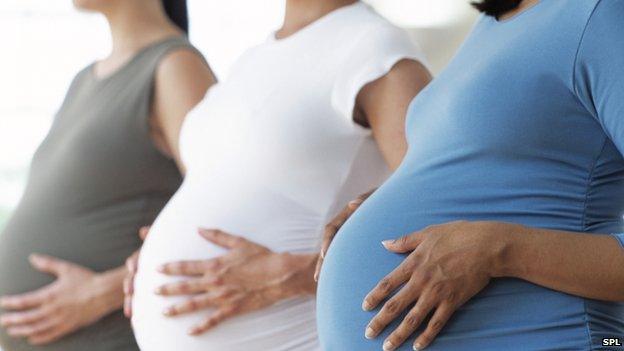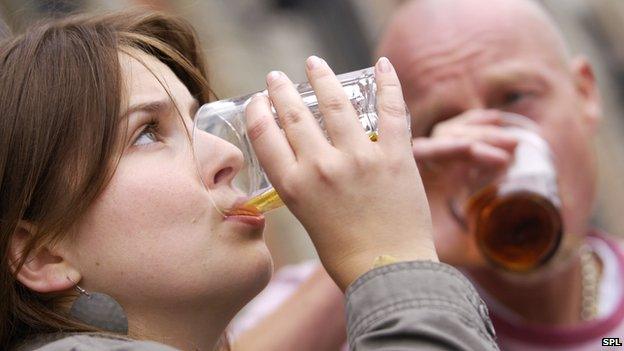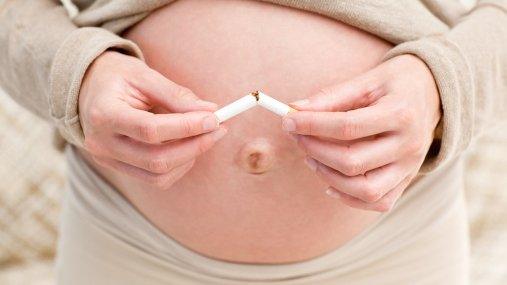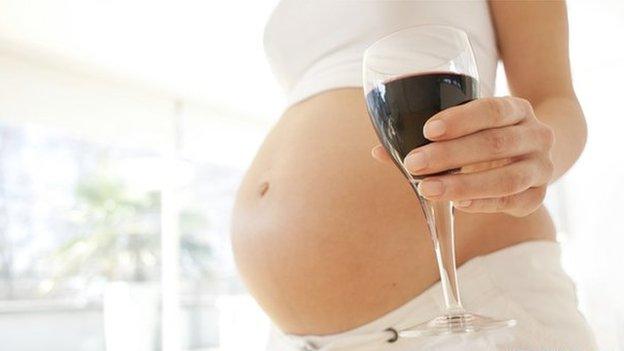Is it ever OK to drink when you are pregnant?
- Published

The advice for when it is OK to drink during pregnancy varies
Women who binge drink and later find out they were pregnant at the time are seeking abortions under the misapprehension their babies will suffer foetal alcohol syndrome, external (FAS), a charity has warned.
The British Pregnancy Advice Service (BPAS) says there is "no need" for an abortion in such cases, as there is "minimal" damage to babies from isolated episodes of binge drinking by their mothers.
FAS is a rare but serious condition that can cause:
facial deformities
restricted growth
learning and behavioural disorders
a poor memory or short attention span
Statistics for the incidence of the disorder in the UK are not available, but in America, experts say, external 0.2 to 1.5 cases occur for every 1,000 live births in certain areas of the country.
BPAS says this risk is incredibly small and women should not needlessly fear their behaviour has damaged their baby.
A Danish study in 2012 of more than 1,600 women, external suggested low-to-moderate drinking was not linked to adverse neurological effects in five-year-olds, but heavy, weekly drinking was associated with a lower attention span in the children.
So when is it OK to drink during pregnancy?
Weekly tipple
Up until the 1980s, pregnant women were advised to drink stout to boost their iron levels. Official advice today is somewhat different.
Pregnant women should avoid alcohol altogether, says the British government. And if alcohol really must be consumed, it should be limited to the equivalent of one small glass of wine, once or twice a week, it adds.
This advice is mirrored by the Royal College of Obstetricians & Gynaecologists, external, (RCOG), which says the safest option for women is not to drink at all for the first 12 weeks and then minimal amounts per week after that.
Meanwhile, national guidelines from the National Institute for Health and Care Excellence say women should not drink for the first three months of their pregnancy, to minimise the risk of miscarrying.
And after that, it says pregnant mothers should drink only one to two units a week.
Alcohol and the womb
Alcohol can disrupt the baby's normal development in the womb, its health at birth, susceptibility to illness in infancy, childhood, teenage years and later life, warns the RCOG.

Binge drinking during pregnancy tends to have an "all or nothing" effect, says the RCOG
It says the effects of drinking are "most harmful" just before pregnancy, due to the way alcohol hampers fertility, in both men and women - the mechanism of which is largely unknown.
Later in pregnancy, the shared blood supply between the mother and her baby via the placenta means that any alcohol that is consumed could easily reach the baby.
Before this - soon after conception and often prior to the woman finding out she is pregnant - could be a different matter.
There is limited evidence about how alcohol affects the baby before there is a direct line between the mother and baby's blood supply, which happens about week four of pregnancy, external, the point at which a woman might be aware of missing her period and suspecting she is pregnant.
Understandably, it is ethically difficult to study. This uncertainty means experts often err on the side of caution when providing advice.
Dr Patrick O'Brien, a spokesman for the RCOG, says: "The general consensus is something harmful like alcohol tends to have an all or nothing effect [in the very early stages of pregnancy].
"It tends to cause a miscarriage or it has no harmful effect."
He said such a situation is "very common" and he gets women coming to him every week worried they have drunk heavily before knowing they were pregnant.
If the baby is still alive after such drinking, he says, the likelihood is it will be healthy.
Nature's buffer
Dr O'Brien added that the mother's liver had a "lot of reserve" so could handle supporting the blood supply of an embryonic child while processing alcohol at the same time.
But he warned it could not deal with "consistent, heavy" alcohol intake.
The jury is largely out about exactly how much alcohol can be drunk during pregnancy, and when.
New draft guidelines from the government are expected to be released in the middle of next year - until then, the Department of Health suggests anybody concerned they have drunk too much alcohol during pregnancy should contact their doctor.
"The chief medical officer is currently reviewing all the guidelines for drinking," said a spokesman.
- Published19 June 2014

- Published24 April 2014

- Published5 March 2014
